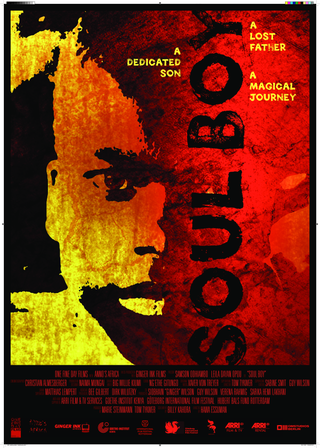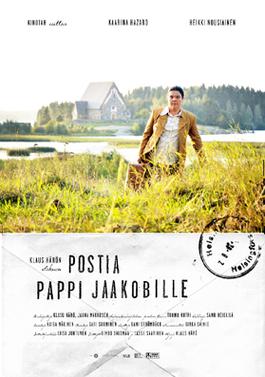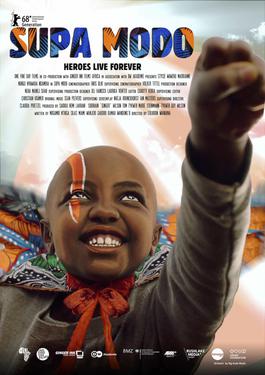Related Research Articles
François Verster is an independent South African film director and documentary maker.

The cinema of Kenya refers to the film industry of Kenya. Although a very small industry by western comparison, Kenya has produced or been a location for film since the early 1950s when Men Against the Sun was filmed in 1952. Although, in the United States, jungle epics that were set in the country were shot in Hollywood as early as the 1940s.
From a Whisper is a Kenyan drama film written and directed by Africa Movie Academy Award winner Wanuri Kahiu. The film received 12 nominations and won 5 awards at the Africa Movie Academy Awards in 2009, including Best Picture, Best Original Soundtrack, Best Director, Best Original Screenplay and AMAA Achievement in Editing. The film also won the Best Feature Narrative award at the 2010 Pan African Film & Arts Festival, and was honored with the 2010 BAFTA/LA Festival Choice Prize. Although the film commemorates the 10th anniversary of the 7 August terrorist bombing in Kenya in 1998, it is not about the terrorist bombing. The movie portrays a realistic story of the aftermath of the bombing, by capturing the lives of the victims and their families who had to pick up the pieces of their lives shredded by the blast.

Zanzibar International Film Festival (ZIFF), also known as Festival of the Dhow Countries, is an annual film festival held in Zanzibar, Tanzania and one of the largest cultural events in East Africa. ZIFF is a non-governmental organization established in 1997 to develop and promote film and other cultural industries as catalyst for the regional social and economic growth.

Soul Boy is a 2010 Kenyan drama film, written by Billy Kahora and directed by Hawa Essuman. It developed under the mentorship of German director and producer Tom Tykwer in Kibera, one of the largest slums in the African continent, in the middle of Nairobi, Kenya. The film has received five nominations at the 2011 Africa Movie Academy Awards.

Letters to Father Jacob is a 2009 Finnish drama film written and directed by Klaus Härö. Set in the early 1970s and based on a story by Jaana Makkonen, the film tells the story of Leila, a pardoned convict, who becomes an assistant to a blind priest, Jacob. The film depicts her transformation from a sceptic who grudgingly reads letters aloud to her benefactor into a caring savior of the pastor from his despair after the letters stop coming.
Steven Markovitz is a South African film and television producer. He has produced, co-produced and executive-produced features, documentaries and short films. Steven has been producing and distributing for over 20 years. Since 2007, he has worked all over Africa producing documentary series' and fiction. He is a member of AMPAS, co-founder of Electric South & Encounters Documentary Festival and the founder of the African Screen Network.

Veve is a 2014 Kenyan drama film directed by Simon Mukali. VEVE is a co-production of One Fine Day Films and Ginger Ink.

Intellectual Scum is a 2015 Kenyan short film directed by Njue Kevin. Produced by Rocque Pictures, the film is an adaptation of the controversial article 'You Lazy (Intellectual) African Scum!' by Field Ruwe, a USA based Zambian media practitioner.

Njué Kevin is a Kenyan film director, producer and screenwriter. He is best known for writing and directing the film 18 Hours which won the Best Overall Movie in Africa, AMVCA 2018. This category had never seen a Kenyan film be nominated, and so marked history as the first Kenyan film to be nominated and win in the history of the awards.
Kalasha Film & TV Awards is an annual accolade presented by Kenya Film Commission with a goal to recognize and celebrate achievers in Kenya's TV and film industry. Entries into the award ceremony are films and TV series that have been aired on Kenyan television stations. The inaugural awards were held in 2010 at the Crowne Plaza in Upper Hill, Nairobi and subsequent awards are held yearly at the last quarter of the year at the same venue. The awards represent the five original branches of film making: directors, actors, writers, producers and technicians. However, the Academy organizers will advise on whether or not to include more categories as long as they sufficiently represent the entire film industry.

Judy Kibinge is a Kenyan filmmaker, writer and producer. She has produced, written and directed a number of films, best known are Something Necessary (2013), Dangerous Affair (2002), and Project Daddy (2004). She is also known for establishing Docubox, a documentary film fund for African filmmakers to help them produce and distribute their film. She released her first film, The Aftermath, in 2002 and critics have said that she uses her films to impart stories about Kenya, particularly those about women and others that are typically not told in mainstream Hollywood.
Anjali Nayar is a Canadian-Indian filmmaker, former climate scientist, and founder of the TIMBY suite of environmental and human rights reporting tools.

Supa Modo is a 2018 internationally co-produced drama film directed by Likarion Wainaina. It first premiered at 68th Berlin International Film Festival. It was selected as the Kenyan entry for the Best Foreign Language Film at the 91st Academy Awards, but it was not nominated.
The Cut is a 2017 Kenyan film directed by Peter Wangugi Gitau.

Poacher is a 2018 Kenyan / British short film directed by Tom Whitworth. The film received wide international attention after its release in Netflix in September 2020. It also became the first ever Kenyan film to be released via Netflix.
Jane Munene-Murago is a Kenyan filmmaker, the first woman to study film in Kenya. Most of her films have been documentaries, produced through her company CineArts, on issues affecting women.
Mbithi Masya is a Kenyan filmmaker, artist and writer born in Nairobi, Kenya on 13 December,1985.

Lusala is a 2019 Kenyan drama film written by Silas Miami, Wanjeri Gakuru and Oprah Oyugi, and directed by Mugambi Nthiga on his directorial debut. The film stars Brian Ogola, Alyce Wangari, Stycie Waweru, Mkamzee Mwatela and Alan Oyugi in the lead roles. The film is based on the life of a 22 year old young man Lusala, who is caught between his personal mental health issues and his sibling affection. The film had its initial release in Kenya on 6 June 2019 during the NBO Film Festival and was also screened at a few other international film festivals.
Serah Mwihaki is a Kenyan actress and scriptwriter. She kicked off her acting career with a lead role in Kenyan Film Dangerous Affairs in 2002. She created TV Series Changes that was adopted by M-NET in 2009 and co-wrote Nairobi Half Life in 2012 and Kidnapped.
References
- 1 2 "Hawa Essuman" (in German). Filmportal.de. Retrieved 6 February 2016.
- 1 2 3 "About the director". African Film Festival New York. Retrieved 6 February 2016.
- ↑ "Liff awards 2011" (PDF). limbo7.com. Retrieved 6 February 2016.
- ↑ "Hawa Essuman and the Soul Boy Project". African Women in Cinema Blog. 28 August 2010. Retrieved 10 February 2016.
- ↑ "Silas". Riverrun Film Festival. Archived from the original on 2023-02-02. Retrieved 2021-07-19.
- ↑ "ZIFF 2018 - OFFICIAL SELECTION". Zanzibar International Film Festival.
- ↑ "Warszawski Festiwal Filmowy".
- ↑ "Silas (William W. Warner Award Winner)". Environmental Film Festival.
- ↑ "2010 Winners. Signis Award". ziff.or.tz. Zanzibar International Film Festival. 2010-08-25. Archived from the original on 2010-08-25. Retrieved 30 January 2024.
- 1 2 3 "Kalasha 2010 Winners". www.kalashaawards.co.ke. Archived from the original on 2012-11-22. Retrieved 2018-04-27.
- ↑ Kenya International Film Festival: Best Actor [ permanent dead link ]
- ↑ Kenya International Film Festival: Best East African Film [ permanent dead link ]
- ↑ "Programm 2011". www.kirchliches-filmfestival.de (in German). Kirchliches Filmfestival Recklinghausen. Archived from the original on 2017-03-15. Retrieved 2024-01-30.. No mention of the prize here.
- ↑ Best Editor, African Movie Academy Awards Archived 2011-04-03 at the Wayback Machine